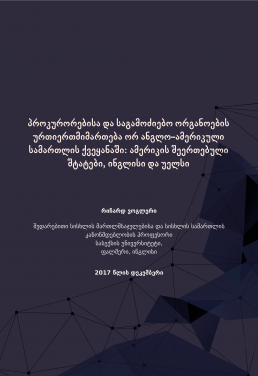საერთო ცხელი ხაზი +995 577 07 05 63


Number Of Pages: 35
Publication Year: 2017
Authors:
The aim of this short report is to analyse the relationships between prosecuting authorities and
investigatory agencies in two common law jurisdictions, in order to provide a comparative context
to recent developments in this area in Georgia. The focus will be specifically on the levels of
autonomy and independence of these agencies, first from the government executive authority and
second from each other. It will identify the point in each case at which the balance of authority in
a criminal process, shifts from investigatory agency to prosecution agency and how this occurs.
The two jurisdictions selected are the United States and England and Wales.
This choice is determined by the fact that these systems operate adversarial modes of process
which are not dissimilar to those developed in Georgia since 2009 and therefore lessons learned
from these two countries may be potentially applicable. Adversariality, although a highly contested
concept1, is unquestionably driven by the party production of evidence and hence the role
and independence of the police and prosecution assumes an importance which it does not hold
in civil law countries. In those countries, evidence collection and its production in court can be
seen as a collective undertaking2 and therefore lines of demarcation between different agencies are
of lesser significance. As a result, prosecution authorities usually direct policing activities in these
countries. As Elsner and Lewis put it:
“In almost all civil law systems studied the (prosecution service) is traditionally
regarded as the sole ruler of the investigative stage. Although both the (prosecution
service) and the Police are organisationally independent institutions, answerable to
different ministries, the Police are directly responsible to the (prosecution service)
in relation to investigatory functions.”
Voigt and Wulf have also shown that countries with a common law legal origin perform better
in ensuring the independence of prosecutors than countries with a civil law background. It is
argued here that a rights-respecting and effective criminal procedure is best achieved by a clear
separation and differentiation of roles between different participants, especially in adversarial
process. In other words, investigators should investigate and prosecutors should prosecute and
neither should be necessarily subordinated to the other. This study will therefor focus on the institutional characteristics which reinforce the independence and autonomy of these agencies in
the target countries. The first important factor in achieving separation between the agencies is
specialist professionalism5 and the second is institutional and bureaucratic integrity. Simon has
argued for a “post-bureaucratic” model of regulation to control prosecutorial (and by implication,
policing) discretion. In his view this can be associated with transparency, fairness and new forms
of democratic control by stakeholders.6 The study of the relationship between prosecutors and
investigators in the United States is therefore particularly pertinent since, alone amongst states,
direct democratic election is here an essential element in securing independence. The district
attorney is, as Kress puts it “a distinctive and uniquely American contribution”7 and as a result, as
Ma points out “no European prosecutors … can compare with American prosecutors in terms of
discretionary power and the influence on criminal justice policy”.8 Commentators are also quick
to noted that direct democracy of this nature can lead to a populist emphasis on penal severity.
Nevertheless, other countries, including England and Wales in 2012, have begun to experiment
with more limited forms of democratic participation.
The study of policing has a long and distinguished comparative research history but this is not the
case with prosecution10 and certainly not with the relationship between the two. This is surprising
since the power of prosecutors has been growing dramatically in recent years across all criminal
justice systems around the world11 and the relationships with investigatory agencies changing.
This situation is beginning to be remedied, with Waters’ monumental, nine country comparative
work in 200912 and important recent volumes by Jehle & Wade in 200613, Luna & Wade in 201214
and Langer and Sklansky in 2017.15 The intention here is to contribute to that growing literature
with a particular focus on police/prosecutor relationships in the two target countries.
The website accessibility instruction